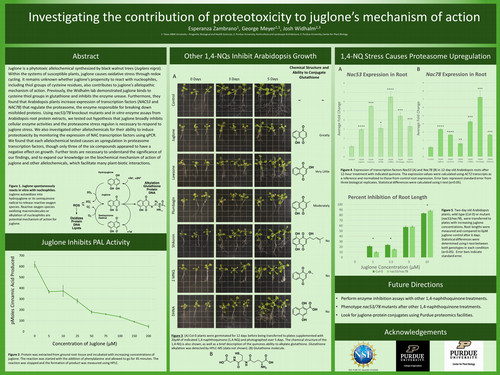Juglone is a phytotoxic allelochemical synthesized by black walnut trees (Juglans nigra). Within the systems of susceptible plants, juglone causes oxidative stress through redox cycling. It remains unknown whether juglone’s propensity to react with nucleophiles, including thiol groups of cysteine residues, also contributes to juglone’s allelopathic mechanism of action. Previously, the Widhalm lab demonstrated juglone binds to cysteine thiol groups in glutathione and inhibits the enzyme urease. Furthermore, they found that Arabidopsis plants increase expression of transcription factors (NAC53 and NAC78) that regulate the proteasome, the enzyme responsible for breaking down misfolded proteins. Using nac53/78 knockout mutants and in vitro enzyme assays from Arabidopsis root protein extracts, we tested out hypothesis that juglone broadly inhibits cellular enzyme activities and the proteasome stress regulon is necessary to respond to juglone stress. We also investigated other allelochemicals for their ability to induce proteotoxicity by monitoring the expression of NAC transcription factors using qPCR. We found that each allelochemical tested causes an upregulation in proteasome transcription factors, though only three of the six compounds appeared to have a negative effect on growth. Further tests are necessary to understand the significance of our findings, and to expand our knowledge on the biochemical mechanism of action of juglone and other allelochemicals, which facilitate many plant-biotic interactions.
Faculty Mentor: Dr. Joshua Widhalm
Purdue University
Department of Horticulture and Landscape Architecture
Funded by NSF Research Experience for Undergraduates


